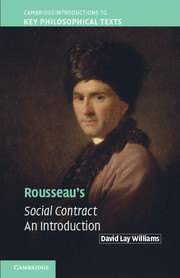Appendix A - On the General Will
Published online by Cambridge University Press: 05 June 2014
Summary
Among the many potential frustrations confronting readers of the Social Contract is the simple fact that Rousseau never commits to spelling out the meaning of his most important concept, the general will, in anything approaching a straightforward or analytic fashion. As Bertrand Russell remarked, regarding the all-important details of the general will, “Rousseau leaves us in the dark.” He introduces the general will several pages into the text (SC, 1.6.9, 50 [IV: 361]), and does so without so much as a hint of definition. As he progresses, the general will becomes increasingly and obviously central to his program – so much so that Judith Shklar commented, “the general will is Rousseau’s most successful metaphor. It conveys everything he most wanted to say.” But he never offers the kind of systematic account that such concepts typically demand. It is difficult to say precisely why Rousseau fails to do so. It is presumably not because he was averse to straightforward definitions. In his Second Discourse, he is remarkably and admirably direct in defining his central terms of equality, amour propre, amour de soi, and pitié. He also offers precise definitions of terms like “citizen,” “subject,” “state,” “republic,” “tyranny,” and “despotism” throughout the Social Contract. One possible reason he never offers a systemic account of the general will is simply that the term was already known to most of the book’s target audience of erudite political thinkers.
- Type
- Chapter
- Information
- Rousseau's Social ContractAn Introduction, pp. 245 - 271Publisher: Cambridge University PressPrint publication year: 2014

